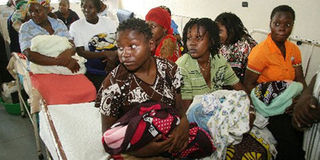Poor Kenyan women worse off in marriage race

Photo/FILE
Mothers at a maternity hospital. Youth birth rate contributes to just over one third of the total births in the overall fertility in the country — 37 per cent during the period 2005-08.
Many young Kenyan women are getting married early, frustrating the drive to keep families small and contain the rapid rise in population.
According to the Kenya Demographic and Health Survey data, almost half of young women are marrying before their 20th birthday, opening the door to prolonged child-bearing lasting more than a quarter century.
Ordinarily, the child-bearing age lasts between 15 and 49 years.
Experts are calling for campaigns among the youth to discourage early marriages as one way of controlling the country’s population now at 41.6 million.
“We must devise urgent ways of encouraging young men and women to marry when they are about 30 years or more,” says University of Nairobi’s population studies lecturer Wanjiru Gichuhi.
“It will be difficult for us to feed and keep our children healthy at the present fertility rates,” she says.
Education levels
Despite the fact that education levels among Kenyans have been rising, the average age of first marriage by women remains the same.
Even more worrying is that poor women are more likely to marry early — and start having sex much earlier than wealthier women.
Data indicates that the median age of first marriage among women aged between 25-49 years is 20 years, nearly the same as it was in 2003 when it was 19.7 years.
Dr Caroline Kabiru, a researcher in adolescent sexual and reproductive health, explains that wealthier women are more likely to be well-educated and in employment.
They are likely to delay marriage, plan their families and have adequate incomes to fend for their children.
“Some of them are likely be in continuing education where they avoid becoming pregnant to ensure they don’t drop out of school,” says Dr Kabiru, who works at the African Population and Health Centre in Nairobi.
Wealthier and well-educated women also have greater access to information on the benefits of delaying marriage.
Poor women, Dr Kabiru says, are likely to marry early thinking that their lives would improve by sharing men’s resources.
Kenya Institute for Public Policy Research and Analysis executive director Moses Ikiara says women who marry earlier, on average have more children.
“The fertility rate remains high in terms of the children per woman,” he told a conference in Nairobi this week.
In contrast, only 10 in every 100 men marry before their 20th birthday. Nearly half of them marry by the age of 25, five years more than the women average.
According to demographic survey, urban women tend to marry almost three years later than their rural counterparts.
Those from North Eastern, Nyanza, Western, Coast and Rift Valley provinces generally marry earlier than those in Nairobi, Central and Eastern provinces.
The median age at marriage for North Eastern is 17.9 years compared to 24 years in Nairobi. Dr Kabiru says regions where poverty is high and education levels lower are more likely to have early marriages.
She suggests young people should be persuaded to shun early marriages through campaigns such as ‘Nakufeel’ and ‘Nimechill’ to encourage the youth to avoid casual sex.
For men, says the demographic survey, the median age for marriage is nearly the same for those in towns and rural areas.
The survey shows that about half of women in the country have sex by age 18 and men earlier. For instance, 19 per cent of men aged 20-49 had sex before age 15.
“Younger men started sex much earlier than older men,” the study says. It is instructive that women in rural areas start sex about two years earlier than their urban counterparts.
Dr Gichuhi says girls in rural areas have sex earlier because many drop out of school or are encouraged to do so if they fail to go to the next class.
“If we have more girls staying on the education path, then we may have many of them delaying sex,” she says, and adds: “The more women remain in school, the more they are likely to delay marriage.”
Dr Ikiara says the fertility rate among poor women is more than twice that of the wealthier. Richer women have a fertility rate of three children per woman while for the poor it is seven.
Dr Ikiara notes the median age of first birth for poor women is 18.9 years, about three years earlier than the wealthier ones.
Despite early motherhood, the use of contraceptives among poor women is only 17 per cent compared to 48 per cent among the wealthier.
Although the youth fertility rate in Kenya has been declining, Dr Ikiara says, their contribution to overall fertility has been increasing.
The youth birth rate contributes to just over one third of the total births in the overall fertility in the country — 37 per cent during the period 2005-08.
High birth rates
Dr Ikiara says the stagnation in fertility rates at a high of five births per woman is worrying as is the high fertility among youth.
Despite a rapid decline in birth rate in the early 1990s, Kenya is one of the countries in sub-Saharan Africa with high unplanned pregnancies.
While most women in Kenya want fewer children than in the past, use of modern methods of contraceptives remains low at around 39 per cent.
Dr Ikiara says the biggest problem with increasing the use of contraceptive is over-dependence on donor funding.




